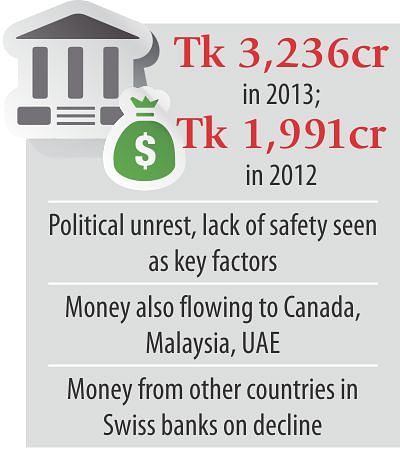62pc rise in Swiss bank deposits
62pc rise in Swiss bank deposits

Deposits by Bangladeshi citizens at various Swiss banks rose by 62 percent year-on-year in 2013, mainly due to political unrest and lack of safety throughout the year when many predicted a government changeover.
The deposits that stood at Tk 3,236 crore (372 million Swiss franc) at the year end were Tk 1,991 crore in 2012, according to the latest data of Swiss National Bank (SNB), the country's central bank.
In contrast, the money held in Swiss banks by foreign clients from across the world continued to decline and stood at a record low of 1.32 trillion Swiss francs (about $1.56 trillion) at the end of 2013, according to the figures released on Thursday.
But the flow of funds from India, Pakistan and Bangladesh did not derail, coincidentally in the election year in the three countries.
The funds, described by SNB as liabilities of Swiss banks or amounts due to their clients, are the official figures disclosed by the Swiss authorities.
SNB's official figures do not include the money that Bangladeshis or others might have in Swiss banks in the names of entities from different countries.
Switzerland is not the only country that has received the Bangladeshi funds, as experts have added the names of Canada, Malaysia and the UAE to the list.
Lawmakers and government officials raised the issue during pre-budget discussion with the finance minister. The latest revelation from the Swiss central bank shows that the outflow of money was higher than anytime in the past.
Officials said businessmen put their money in foreign countries due to lack of safety, while politicians and bureaucrats who earned money through illegal means did the same fearing a government changeover or takeover of a regime like the 2006-07 army-backed caretaker administration that clamped down on illegal money holders.
Salehuddin Ahmed, a former governor of Bangladesh Bank, blamed the chaotic politics and a lack of security in 2013 for the rise in the flows of money to Swiss banks.
He, however, said he does not think that all of those money were laundered from Bangladesh.
"Many Bangladeshis have stashed their incomes from external sources with the Swiss banks," he told The Daily Star.
He said Bangladeshi money is also being invested in other countries such as Malaysia and Canada in the real estate sector.
"Those who are earning illegally are also sending their money to countries deemed safe havens."
Salehuddin Ahmed also said the funnelling of money outside the country has not stopped, as uncertainty still persists and there is serious lack of good governance.
"For stalling the illegal flow of the money, the government will have to rise over partisan politics and take some punitive measures. The law and order situation and the governance have to be improved."
Zahid Hussain, lead economist of the World Bank in Dhaka, said many including businessmen did not consider Bangladesh a safe place to keep their money due to the deadly violence and a strong possibility of a government changeover in 2013.
"The money has flown outside through both official and unofficial channels," he said.
Talking about the unofficial channel, the economist said the difference between the formal and informal market rates of US dollar was Tk 4 second half of last year.
Normally, the difference between the two markets remains below Tk 1.
Zahid Hussain said the official channel comprises under- and over- invoicing.
The country produces a significant amount of food although the food import went up recently. Besides, the imports of capital machinery were also higher although investment is scarce.
Food imports stood at $1.19 billion in the first 10 months of the current fiscal year. Additionally, letters of credit worth $1.13 billion were opened at the same time, according to figures from Bangladesh Bank.
During the same time, imports of capital machinery were $2.09 billion. LCs worth $3.09 billion were opened for future imports.
"In the current perspective, the figures are questionable," said Hussain.
Nazneen Sultana, a deputy governor of Bangladesh Bank, said the central bank and the National Board of Revenue are working together to stop irregularities in cases of under- and over-invoicing.
"Bangladesh Bank's data on import and export are becoming automated. The Customs data of NBR will also be automated. Both will have access to each other's database," she said.
"The integrated system will soon be activated. Then we will be able to stop this type of irregularity."
Bangladesh has enacted anti-money laundering laws and signed agreements with some countries to stop the illegal flow of money.
The latest development came less than a year after the country became a member of global anti-money laundering body EGMONT Group.
However, the government has not signed any agreement with Switzerland on information sharing on money laundering issue, said Mahfuzur Rahman, an executive director of Bangladesh Bank.
“Bangladesh will not be able to get required information from countries such as Switzerland. To get information, Bangladesh will have to approach the foreign banks or authorities with adequate evidence of irregularities and verdicts from courts. Then the external parties will cooperate," said Rahman, who heads the central bank's anti-money laundering department.
For several decades, Switzerland has provided wealthy families around the world a convenient and safe place to stash their money.
The country's political neutrality, stability, and tradition of bank secrecy have kept their fortunes beyond the reach of national governments and the most determined tax collectors.
Although Switzerland is facing growing pressure from many other countries to share foreign client details, Geneva still has appeal -- if not for secrecy, then for stability.